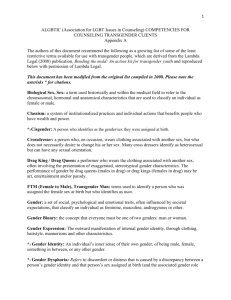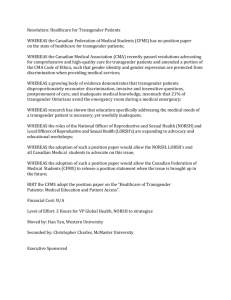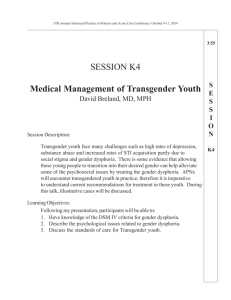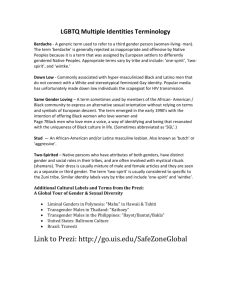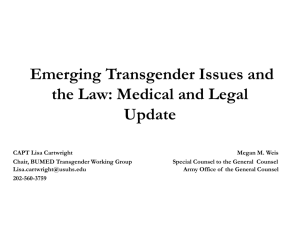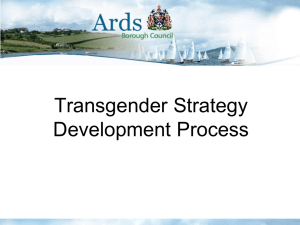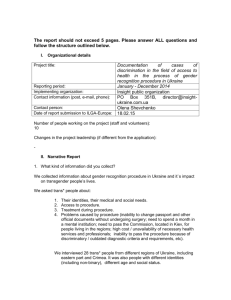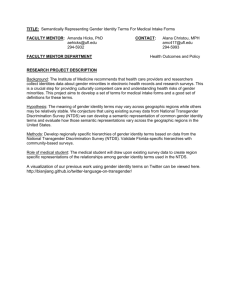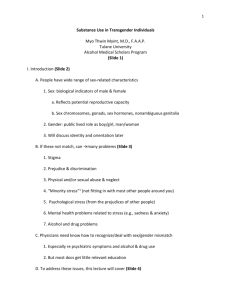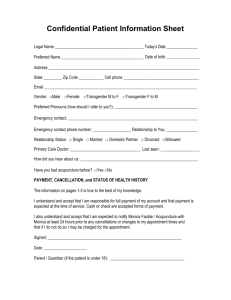Gender Identity Clinic GIC
advertisement
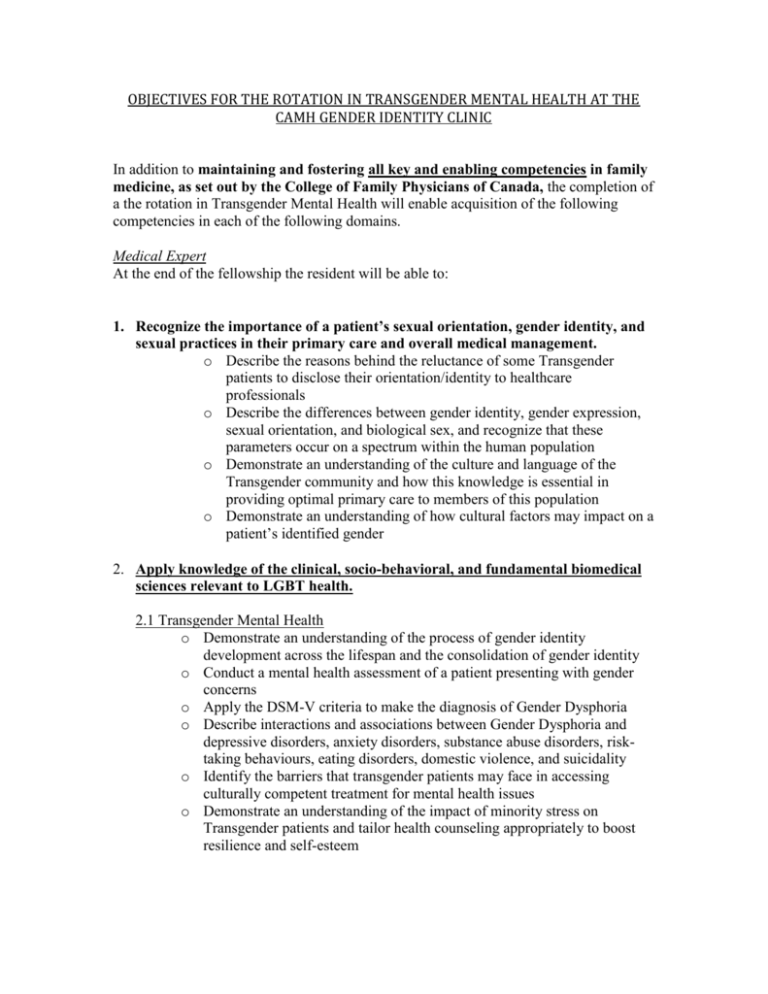
OBJECTIVES FOR THE ROTATION IN TRANSGENDER MENTAL HEALTH AT THE CAMH GENDER IDENTITY CLINIC In addition to maintaining and fostering all key and enabling competencies in family medicine, as set out by the College of Family Physicians of Canada, the completion of a the rotation in Transgender Mental Health will enable acquisition of the following competencies in each of the following domains. Medical Expert At the end of the fellowship the resident will be able to: 1. Recognize the importance of a patient’s sexual orientation, gender identity, and sexual practices in their primary care and overall medical management. o Describe the reasons behind the reluctance of some Transgender patients to disclose their orientation/identity to healthcare professionals o Describe the differences between gender identity, gender expression, sexual orientation, and biological sex, and recognize that these parameters occur on a spectrum within the human population o Demonstrate an understanding of the culture and language of the Transgender community and how this knowledge is essential in providing optimal primary care to members of this population o Demonstrate an understanding of how cultural factors may impact on a patient’s identified gender 2. Apply knowledge of the clinical, socio-behavioral, and fundamental biomedical sciences relevant to LGBT health. 2.1 Transgender Mental Health o Demonstrate an understanding of the process of gender identity development across the lifespan and the consolidation of gender identity o Conduct a mental health assessment of a patient presenting with gender concerns o Apply the DSM-V criteria to make the diagnosis of Gender Dysphoria o Describe interactions and associations between Gender Dysphoria and depressive disorders, anxiety disorders, substance abuse disorders, risktaking behaviours, eating disorders, domestic violence, and suicidality o Identify the barriers that transgender patients may face in accessing culturally competent treatment for mental health issues o Demonstrate an understanding of the impact of minority stress on Transgender patients and tailor health counseling appropriately to boost resilience and self-esteem o Demonstrate an understanding of the importance of supportive family and community in mental health outcomes for Transgender patients 2.2 Mental Health and Hormone Therapy o Demonstrate knowledge of the eligibility and readiness criteria for hormonal treatment for Gender Dysphoria according to the WPATH standards of care o Discuss the approaches of ‘informed consent’ versus the evaluation of eligibility and readiness as they apply to the initiation of hormone therapy o Identify psychiatric disorders that present concurrently with Gender Dysphoria and assess the impact that these disorders may have on eligibility and readiness for hormonal treatments o Identify the initiation of hormone therapy as an opportunity to reduce high-risk behaviours and encourage positive lifestyle changes in order to minimize the risks associated with this therapy o Assist the patient in optimizing preparedness and social supports prior to the initiation of hormone therapy o For patients in whom hormone therapy is contra-indicated, support patients in exploring non-pharmacologic means of altering their gender presentation, including voice therapy, chest binding, and electrolysis 2.3 Mental Health and Gender-Affirming Surgery o Demonstrate knowledge of the eligibility and readiness criteria for all available surgical treatments for Gender Dysphoria, according to the current version of the WPATH standards of care o Identify psychiatric disorders that may present concurrently with Gender Dysphoria and assess the impact that these disorders may have on eligibility and readiness for surgical treatments o Identify the consideration of gender-affirming surgery as an opportunity to reduce high-risk behaviours and encourage positive lifestyle changes in order to minimize the risks associated with these procedures o Demonstrate knowledge of the approval processes for patients who wish to access surgical options that are covered by provincial health programs and assist patients in preparation for this process o Demonstrate an understanding of patient-level and systems-level barriers that make it difficult for some patients to access surgical procedures o Describe the various surgeries available for transwomen, demonstrate knowledge of which of these are funded by provincial health insurance, and list the common and serious complications of these procedures, including breast augmentation, orchiectomy, vaginoplasty, facial feminization, voice feminization, and chondrolaryngoplasty o Describe the various surgeries available for transmen, demonstrate knowledge of which of these are funded by provincial health insurance, and list the common and serious complications of these procedures, including chest reconstruction, hysterectomy, bilateral salpingooophorectomy, scrotoplasty, mons resection, metoidioplasty, and phalloplasty o Discuss the risk of post-operative depression following gender-affirming surgeries and identify the factors which may contribute to this phenomenon Communicator At the end of the fellowship the resident will be able to: o Consistently develop rapport with transgender patients to promote respectful and affirming interpersonal exchanges o Exhibit effective communication skills, including verbal and written presentation of patient consultations with the respectful and culturally sensitive use of language to describe patients of diverse sexual orientation and gender identity o Demonstrate sensitivity in determining the constitution of the patient’s family and/or other main social supports o Sensitively manage the communication of patient information regarding gender identity and demonstrate understanding of the consent requirements for communication with third party agents o Demonstrate skills in working with other providers and patients to overcome communication challenges, including anger, confusion, sensory or cognitive impairment, socio-economic or ethno-cultural differences Collaborator At the end of the fellowship the resident will be able to: o Demonstrate an understanding of the roles and specific expertise of psychiatrists, urologists, gynecologists, and plastic surgeons in the surgical care of the transgender patient o Consult with other professionals in a timely manner, when needed for optimal care of the patient seeking medical transition o Actively involve appropriate members of a patient’s health care team in the assessment, planning, and provision of trans-related care Manager At the end of the fellowship the resident will be able to: o Assist a patient in accessing public health insurance funding for surgery related to gender transition o Demonstrate fiscally responsible allocation of government resources in support of patients’ needs Health Advocate At the end of the fellowship the resident will be able to: o Recognize special needs, impairments, disabilities, and resource limitations of patients, and how they may impact on a patient’s ability to meet eligibility and readiness criteria for transition-related medical care o Identify and, when appropriate, inform patients of available specialized resources and community supports related to gender dysphoria and gender transition o Advocate for unbiased and sensitive care of Transgender patients by all healthcare professionals o Describe the scope of actions taken and progress made to date by organizations advocating for Transgender health Scholar At the end of the fellowship the resident will be able to: o Apply lifelong self-directed learning skills to keep up-to-date on advancements in transgender health and enhance areas of professional competence o Appropriately apply evidence-based approaches and knowledge of the current literature to inform clinical decision-making Professional At the end of the fellowship the resident will be able to: o Identify and appropriately respond to unique ethical issues arising in the care of the patient with Gender Dysphoria o Respect personal/professional boundaries with patients, residents, and faculty o Demonstrate insight into his/her limitations and respond appropriately to constructive feedback
